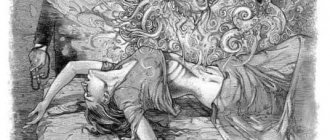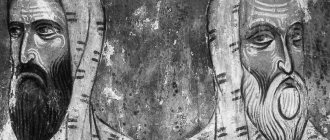Holy Fathers about the state of delusion
According to the definition of the holy fathers, spiritual delusion is divided into two types: mental and heartfelt.
The first includes daydreaming, which is born from improper mental activity. These are dreams, false sensations or any visions during prayer.
The second type of spiritual delusion in Orthodoxy is called opinion. When it arises, a person begins to imagine himself as a great man of prayer who has acquired the gifts of the Holy Spirit. During a prayer vigil, he experiences false feelings of grace.
According to the definition of the saints, spiritual delusion is the damage to human nature by lies. The greatest self-deception is to consider yourself free from it. All people are in delusion; realizing this is the greatest protection against this state. This is how Saint Ignatius Brianchaninov taught.
According to the teachings of St. Gregory of Sinai about delusion, it has three main causes - pride, envy on the part of demons, and the Lord's permission to punish a person.
The reason for pride, in turn, is vanity, demonic envy arises from success, and the Lord’s permission comes from a sinful life. The latter can remain with a person forever, until his death.
This is what else the holy fathers say about spiritual delusion. Let us cite the opinion of St. Theophan the Recluse: one cannot exaggerate the significance of this state, nor should one be afraid of it. Charm happens to those who are proud and decide that their hearts have been touched by warmth. This is where their state of delusion lies in wait, for unclean spirits do not sleep, wanting to seduce a person.
Simeon the New Theologian warns believers with words about the devil's machinations. The evil one always approaches the human soul in such a way that the believer is unaware of his machinations. He tries to disturb all the aspirations and movements of the soul, to direct them to actions beneficial to the Evil One. There is confusion and a storm inside a person, he becomes passionate, the wills of the soul become obscene. This is the state that Orthodoxy calls spiritual delusion.
John Cassian the Roman said about unclean spirits that there are great numbers of them everywhere. They fly between heaven and earth, but people do not see them. The Lord, in His mercy, made demons invisible to human eyes. For they are so ugly that people would be struck with horror at the sight of them, and over time they would become angrier, observing the wicked behavior of demons, being encouraged to even greater recklessness and inciting numerous passions in themselves.
The meaning of this word is something that you have been seduced by on the spiritual path
Charm is something that seduces you. What is flattery anyway? This is a kind of boasting, instilling a false sense of pride in a person. Pride itself is bad, and if it is not based on anything, it is generally a nightmare.
That is, charm is a person’s delusion, his incorrect idea of himself.
It is understood that charm is not someone’s action towards a person, but his flattery to himself. That is, self-deception, excessive conceit - that’s what charm is.
How to get rid of pride
Manifestation of charm
We talk about the main characteristics of this condition, but we never mention how it manifests itself.
Everything is simple and complex at the same time: a person begins to lose control over his thoughts and reasoning, and often turns away from the Truth, accepting false teachings for it. It’s easy to guess who pushes a person to get acquainted with them.
When the volitional sphere of the soul is darkened, people become ardent adherents of evil. A previously kind and reasonable person turns into a devil's toy, unable to resist evil and abandon it. The same thing happens when demons take possession of a person’s irritable power. He, unable to resist temptation, immediately forgets what it means to do good. The deluded person does not have enough strength for good deeds, but as soon as he hears about something bad, he immediately lights up to support this endeavor.
Prelest is a sin, because it entails other terrible sins
Not only does delusion lead us down the wrong path, but it also gradually draws more and more sins into a person’s life.
St. Gregory (Sinaite) tells how this happens:
“For with pride comes delusion (from dreams), after delusion - blasphemy, after blasphemy - insurance, after insurance - trembling, after trembling - madness from the mind.
Inflaming the whole nature and darkening the mind by combination with dreamed idols, she drives him into a frenzy of intoxication from her scorching effect and makes him mad.”
Gregory (Sinaite)
Orthodox saint
In order not to have to fight with charm, it is useful to know its nature:
“It is appropriate to know that delusion has three main reasons for which it occurs: pride, the envy of demons, and punitive tolerance. These are the same reasons: pride - vain frivolity (or vanity), envy - prosperity, punitive indulgence - sinful life. — The delusion of envy and proud conceit is more likely to be healed, especially if someone humbles himself. But punitive delusion—handing over to Satan for sin—is often tolerated by God through abandonment even to death. It happens that innocent people are given over to torment (by demons) in order to be saved. It should be known that the very spirit of proud conceit sometimes makes predictions in those who do not carefully listen to their hearts.
If anyone, with arrogance based on conceit, dreams of achieving high states of prayer, and has acquired not true, but satanic zeal, the devil conveniently entangles him with his nets, like his servant.”
Inexperienced Christians are especially vulnerable to delusion:
“The free will of man conveniently bows to communication with our opponents, especially the will of the inexperienced, new to the feat, as if still possessed by demons. Demons are nearby and surround beginners and self-starters, spreading networks of thoughts and harmful dreams, creating abysses of falls. The city of the novices - the entire being of each of them - is still in the possession of the barbarians... Do not quickly give in to what appears to you out of frivolity, but remain hard, holding back the good with much consideration, and rejecting the evil... Know that the actions of grace are clear; the demon cannot teach them; he cannot teach meekness, quietness, humility, or hatred of the world; it does not tame passions and voluptuousness, as grace does.”
Why does this condition occur in believers?
It is written above that people who are far from God and the temple are susceptible to spiritual delusion. But zealous Christians, monks and clergy can also easily fall into delusion.
It all begins with ardent zeal in prayer, when a monk or an ordinary layman undertakes a feat without being blessed by a spiritual mentor. One priest aptly expressed himself about such ascetics: they read twenty akathists a day, and then their icons glow.
The grace of God works through humility; pride pushes us to unnecessary deeds. In the wonderful Christian book “Red Easter” there is a story about how Optina Pustyn (now a monastery near Kaluga) was opened. Orthodox youth came in large numbers, quickly dressed in all black, and one pilgrim dug himself a dugout in the Optina forest and went into seclusion. Of course, this retreat did not end well, but the author of the book did not write about the great embarrassment associated with the dugout in the forest and the “feat” of the pilgrim. On the one hand, we have before us a funny story, on the other, a mild form of charm. Let us explain that seclusion is the highest spiritual state in which the ascetic renounces everything, completely immersing himself in prayer. Monks deny themselves even the meager things, subduing the flesh. Could a young layman easily renounce everything that previously surrounded him, without having the proper spiritual preparation? It’s unlikely, he simply imagined himself to be an ascetic and a man of prayer, isn’t this spiritual delusion?
The state of delusion among the laity
Many people are very far from God, they go to church several times a year, and they have never heard of home prayer. But there comes a time when they go to confession and don’t know what the “priest” wants to hear from them.
The priest begins to ask leading questions, the confessor looks at him with huge eyes, sincerely wondering why the priest is accusing him of something. A person lives no worse than others: he works, takes care of his family, tries to do good, and not offend anyone. What kind of sins are attributed to him?
The confessor wanted to talk to the priest about life, but the result was misunderstanding and resentment. A person, offended in the best of feelings, leaves the temple and tells his friends how bad the “priests” are, forcing the sinless saint to repent of something.
This is a real charm - a spiritual illness that has afflicted modern humanity. And why all? Yes, because instead of a sober and repentant life, people gravitate toward relaxation and pleasure. They chase after earthly goods and wealth, completely forgetting about God and the church.
Church prayer
About church prayer, know that it is higher than your home prayer, for it ascends from a whole council of people, among whom, perhaps, there are many purest prayers, from humble hearts offered to God, which He accepts, like a fragrant censer, with which yours, although weak and insignificant, are accepted (St. Macarius).
...You especially need to go to church in a peaceful spirit, because prayer is not acceptable unless the imams are offended by someone or someone (St. Macarius).
Church prayer is important, the best thoughts and feelings come precisely in church, however, the enemy in the church attacks more strongly, but drive him away with the sign of the cross and the Jesus Prayer. It’s good to stand in some dark corner of the church and pray to God. “Woe are our hearts!” - the priest proclaims, and our minds often wander along the ground, thinking about indecent things. Fight this (Rev. Barsanuphius).
While the “Most Honest” was being sung, “Reverend Ambrose” stood with his head bent almost to the ground. When the singing ended, the priest sternly said to Mrs. N.: “Why didn’t you bow, but stood like that?” She replied: “In the world I always make six bows when they sing “The Most Honest Cherub,” but here I’m afraid that no one does.” Father again sternly said: “You and your daughter should always bow down! Why do you care if no one puts in? You know, one saw how, during the singing of “The Most Honest,” the Queen of Heaven Herself appeared and approached Her icon. You always deliver” (Venerable Ambrose).
It would seem that in prayer it is enough for us to say once: “Lord, have mercy,” but we say three, twelve, and forty times. This is for those sufferers who cannot even say: “Lord, have mercy.” So the Church prays for them (Venerable Nektary).
Addiction to frequent communion
Pious readers will not be surprised, but others are presented with food for thought.
One of the types of spiritual delusion is frequent communion. Before the readers are two stories told by the holy martyr Arseny (Zhdanovsky) in his book “Spiritual Diary”.
One woman took communion daily. The clergy drew attention to this, instructing the priest with whom she confessed to check the young lady. He, in turn, ordered her to confess every day and did not allow her to take communion when he considered it useful for his child.
Only the woman was indifferent to the prohibitions of the confessor; she began to move from church to church, continuing to take communion daily. Ultimately, the spiritual leadership tracked her down and forbade her to begin the sacrament.
But this did not bother the heroine of the story; she decided that she could receive communion at home. The Lord long ago gave her the right to transform bread and wine into her body and blood. The woman began to perform the “liturgy” on her own, receiving communion at home.
It ended sadly: the lady went crazy and was taken to the appropriate institution.
Another woman, in spiritual delusion, demanded daily communion. The priest reacted sensibly to her demands and asked the question: is the lady worthy to approach the sacrament so often? She, of course, was “worthy”, for she “had no sins,” which she informed the priest about.
How often should you take communion? Only the priest to whom the person is confessing can give an exact answer to the question asked. What should we do for those who do not have a spiritual mentor and begin the sacrament of confession with different priests?
The minimum requirement to receive communion is 5 times a year. Once on each post and on your own name day. There are only four long fasts, respectively, the same number of times a person begins the sacrament of communion.
Some take communion once a month, others twice. There are people who take communion once a week, but they are parishioners of a church, and not rare visitors.
Orthodox Life
What is spiritual charm, where does it come from, is it possible to insure against it, explains Archimandrite Markell (Pavuk), confessor of the Kyiv theological schools.
– Father, what is spiritual charm? Where does it come from?
– In Russian, the word “prelest” has a positive connotation, but in spiritual terms, prelest is a false state of soul that is unconscious to a person, when, under the influence of the passion of pride, he wants to appear better than he really is. Any immeasurable embellishment of oneself with expensive clothes, cosmetics, florid words, feigned actions, smiles is a form of charm. Her beauty is deceptive, and she cannot save the world, but, on the contrary, deceives and destroys it. True, every person has an internal innate defensive reaction, with the help of which you can sense the insincerity of others, but you will not always immediately understand what is going on.
In a state of delusion, a person seems to be living not his own life, but someone else’s life, about which he dreams. For him, life is an ongoing game. It is no coincidence that programs related to the game enjoy the highest ratings in the media. It is also clear why in ancient times the main competitor of the Church was the pagan theater. The Holy Fathers very sharply criticized the actors precisely because they were engaged in acting and, wittingly or unwittingly, infected their viewers with this.
The Church teaches a person to be himself, not to pose, not to show off, not to act, but to live, as they say, breathing deeply. It was precisely because of the desire to be real people, individuals, and not a faceless mass or weak-willed posers, that the first Christians gladly went to torture. As Saint Justin the Philosopher explained the phenomenon of martyrdom, we go to torture because we do not want to live by deception.
According to the Word of God, delusion is the most direct invention of the evil one, who parasitizes on a person’s natural desire to become better. Who among us does not want to grow spiritually, intellectually, physically and financially, who does not dream of a career? It was through the promise of the evil one that charm entered the world. The devil in the form of a serpent in paradise assured the first parents that they would be like gods, and thereby deceived them, but instead of what was promised, spiritual and physical death followed.
– What are the most common types of delusion that can be observed among Orthodox Christians?
– According to the thought of Saint Ignatius (Brianchaninov), delusion is the natural state of all people removed from God. Since we constantly sin and do not always repent of our sins or do it superficially and formally, we are all in delusion. It is obvious that the degree of spiritual charm, like the degree of illness of the body, varies. In the church environment, it often develops under the guise of immoderate zeal for piety beyond reason. In such a state, a person, without the blessing of a spiritual father, undertakes excessive feats of fasting and prayer and, as a rule, quickly gets stressed out and makes many mistakes in his life. Instead of stopping and repenting, he begins to blame those around him: the bishop, priests, parishioners.
Sometimes circles of like-minded people form around such zealots. Thus their Orthodoxy degenerates into sectarianism. Recently, for example, we had a movement against the Taxpayer Identification Number, even earlier – against ecumenism, and now there is a movement against new passports. It is clear that we, Christians, cannot be absolutely indifferent to the processes of globalization, and the Church has issued special conciliar decrees on these issues. Trouble occurs when a Christian, carried away by the fight against globalists, forgets about his personal invisible spiritual battle with the spirits of evil and passions. Primarily, bishops and other authorized people are called upon to influence global political processes. We can help them in this when we fervently pray so that they courageously defend the interests of the Church before the powers that be.
Another type of spiritual delusion is when a Christian feels too sorry for himself and begins to break fasts, skip services, and treat himself to alcohol with or without reason. Because of this, his Christianity becomes like salt, which is thrown out to be trampled underfoot by people. Because of such nominal Christians, many seeking and sincere people who could become zealous members of the Orthodox Church are tempted and fall into the snare of schismatics or sectarians.
– What examples of falling into delusion are there in Christian history? Maybe ascetics, saints?
– Charm is quite contagious, like any other sin. Not only individuals, but also entire nations can indulge in it. It is especially dangerous when a prominent church pastor, whom many people trust, falls into delusion. When he begins to teach a new teaching, those listening are very easily carried away by it. Thus, in the 4th century, the famous Alexandrian presbyter Arius himself was deceived and deceived many people with the new teaching that Christ is not God, but only His highest creation. Then Patriarch Nestorius of Constantinople began to call the Mother of God not the Mother of God, but the Mother of Christ. Later there were Monophysites, Monophilites, Iconoclasts. As we see, quite a large number of people were seduced by the sweetness of newfangled teachings and fell into heresy. In the 11th century, the Great Schism arose due to the fact that almost the entire West was seduced by the new dogma of the primacy (primacy) of the Pope. Protestants and various kinds of sectarians later branched off from them.
But even in our Orthodox church environment, no one is safe from falling into delusion. The most striking example is the Pechersk saint St. Nikita the Recluse, Bishop of Novgorod. Not having sufficient monastic experience among the brethren, he went into seclusion early. Here the devil appeared to him in the form of an Angel and seduced him into worshiping him. Further, at the suggestion of the evil one, the seduced ascetic stopped praying altogether and only studied the books of the Old Testament. When the brethren of the monastery realized that something was wrong with him, they began to pray fervently - and cast out the demon from his cell. Subsequently, Nikita became the Bishop of Novgorod.
– Is it really impossible for a Christian to insure himself against falling into delusion?
– To some extent, this becomes possible when a person regularly confesses and receives the Holy Mysteries of Christ. We need to live the full life of the Church, not withdraw into ourselves, try to communicate with everyone, love everyone, not judge anyone, support everyone and provide all possible help, then they will help us in difficult times and will not let us fall into ruin. It is not for nothing that the Lord said: “I will build My Church, and the gates of hell will not prevail against it” (Matthew 16:13). The measure of our spiritual success should be determined not by the number of prayers read or even by the frequency of Communion, but by our love for people, and not only for those who love us, but also for our enemies. Only in this way can we free ourselves, at least to a small extent, from the sinful charm inherent in everyone and not fall into greater self-deception, which can completely tear us away from God and His Holy Church.
Interviewed by Natalya Goroshkova
How to deal with charm
Is it possible to get rid of spiritual delusion on your own? No, a person is not able to fight against unclean spirits without the help of God. It is necessary to resort to the Savior and the weapons he left for spiritual struggle.
- Prayer and fasting drive away the evil generation. Of course, prayer should be sober, under the guidance of an experienced priest. If the neophyte begins to independently establish prayer rules for himself, make numerous bows and read a huge number of akathists, he will fall even more into a state of delusion. The same applies to fasting; there must be moderation and experienced guidance in everything.
- Attendance at church services, mandatory participation in the sacraments of confession and communion, and during Great Lent - unction. How often to take communion is written above. As for confession, there can be only one piece of advice - the more often, the better for the soul.
- Sober life, strict self-monitoring. We are all lazy, prone to relaxation and idleness. The latter is the mother of all vices; one must avoid it and find something to do. This does not mean that there should be no rest at all, but it cannot replace work.
Spiritual charm is associated with eastern mysticism, but this is incorrect
Radical Orthodox Christians like to criticize Buddhism and Hinduism for their mystical practices. They accuse people of achieving supernatural abilities there. Such teachings are called self-centered and they are seen as a manifestation of delusion.
But this is due to ignorance of other people's traditions. The state of a person during meditation and the supernatural powers that he can receive are by-products of the spiritual path. The very goal there is the same as that of Christians - drawing closer to God.
The Orthodox Church most often refers to stigmata as signs of spiritual delusion. Pictured is Padre Pio of Palestine, a late saint of the Roman Catholic Church. Critics call him a charlatan
The state of delusion in the East is called by different words, but the essence remains the same. As for supernatural forces, the same examples are known in the Catholic and Orthodox churches:
- Stigmata;
- Serendipity;
- Levitation;
- Communication with animals;
- The ability to heal.
And much more. But what a mistake an outsider would make if he said that the goal of an Orthodox Christian is to achieve clairvoyance or learn to cast out demons. The same is true in Eastern teachings.
About self-pity and despondency
Do not feel sorry for yourself - these words are spoken by many priests when giving parting words to a layman. People tend to engage in self-pity and view their lives from the most negative point of view. This is where despondency comes from; a person doesn’t want anything. What kind of church, confession and communion is there? A Christian lies on the sofa with a dull gaze, he develops apathy and indifference to everything. Unclean spirits are happy, circle around the sufferer and give him sad thoughts. Giving in to despondency is the last thing for a Christian.










